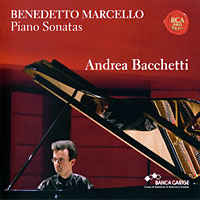REVIEW
november 2011
Benedetto MARCELLO (1686-1739)
Sonata III in sol maggiore [7:02]
Sonata V in re minore [8:32]
Sonata VII in la minore [11:01]
Minuetto in do maggiore [1:39]
Sonata X in do minore [7:02]
Sonata IX in la maggiore [7:02]
Minuetto in do maggiore [1:39]
●
Andrea Bacchetti (piano)
rec. APRIL 2010, Fazioli Concert Hall, Sacile
●
RCA/SONY MUSIC 88697814662 [55:26]

Andrea Bacchetti is something of a pioneer of Italian keyboard music which is somewhat still off the beaten track when
it comes to piano repertoire. His Galuppi and Cherubini discs were both very good indeed (see review), and they are now
joined by an equally classy recital of sonatas by Benedetto Marcello, a composer better known through a few concertos
and his cello sonatas.
Marcello was a Venetian and a younger contemporary of Vivaldi, and as with numerous other composers from that period and
locality has fallen somewhat under the shadow of his illustrious and famous colleague. The booklet notes are both printed,
and extended further on pdf files included on this enhanced CD which has a few extra built-in ROM features, not all of which
I could access on my antique laptop. They make the point that, long forgotten, "the manuscripts for these sonatas
reflect the atmosphere of another Venice, severe and ascetic, seen through the eyes of a composer who could look beyond
appearances, providing in his music the strength of a moving spirituality". The pdf notes delve further into the
historical context and fascinating manuscripts from which these recordings, some of which are world premières, are derived.
The opening Sonata III is strange with its repeated notes in the first movements, and almost naive in the octave bass, oh-so
simple theme and parallel progressions in the following Andante. Don't be deceived however. There are gorgeously stately
slow movements, and those which convey more sophisticated popular entertainment value; the energetic final Allegro of the
Sonata V being just one case in point. More striking are the dissonances which knock the Sonata VII off track in its second
Adagio section. There are moments where the music is so sparing that it seems almost not to be there at all, such as with
the Cantabile e Largo, and Bacchetti sensibly restricts his embellishments in these two-part moments of serenity to observing
those of a conventional type: just a few cadential trills and the occasional turn, allowing the expressive notes their full
value as they stand. Marcello knows a "hook" when he has one, and the final Minuetto of this sonata has a distinctive
arpeggio motive which fixes the piece in the mind like a paperclip on the page of a diary.
There's drama too, and the opening of the Sonata X is like an opera overture, with insistent repeated notes shutting up the
noisy audience and dragging their attention to the action about to commence on stage. The Largo which follows is the longest
movement in the whole programme at over seven minutes, challenging Vivaldi and indeed Pergolesi for expressive power expressed
with a minimum of means. There are even moments where an ageing Liszt is also called to mind, such are the searching properties
in some of the progressions here.
We mustn't get too far away from what's actually heard on this CD, but there are little echoes and associations all over the place,
such as in Sonata X, with its Scarlatti-like Presto third movement. This is music which is honest to itself - sometimes challenging
us in its very simplicity and directness. There are moments where a movement might be little more than a sequence of sequences,
such as in the finale of Sonata X, and yet the ear remains fascinated. This of course has much to do with our guide in this music,
and Andrea Bacchetti is a very sympathetic performer, exquisitely making each movement into something special, but doing this by
allowing the notes to speak for themselves rather than seeking to find hidden meanings or make things too profound. Bacchetti's
playing is disarming in its directness, but the more you listen the greater the discoveries to be found in subtleties of shading,
colour and phrasing, helped by a superbly prepared Fazioli instrument placed in a pleasantly spacious acoustic. The engineers may
have helped things along a little as far as this goes, but I for one don't care. This is a very fine disc of some rare music, and
I'm delighted to have it for company for those all too rare fine moments when very little is needed, and nothing else will do.
Dominy Clements


